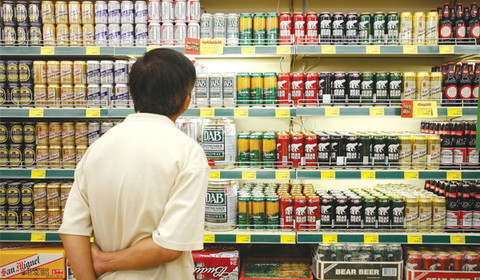
The proposed mixed tax regime on alcohol products causes controversy over its approriateness in Việt Nam. — Photo doanhnhansaigon.vn
The proposed mixed tax regime needs to be considered to ensure fairness among producers of different business scales, especially in the beer industry, according to the Việt Nam Association of Financial Investors (VAFI).
VAFI was commenting on the Ministry of Finance’s proposal for amending the Law on Special Consumption Tax which aimed to raise the excise taxes to increase the selling prices of products by at least 10 per cent to limit consumption, protect health, increase budget revenue and create a fair and transparent business environment for enterprises.
Under the ministry’s proposal, two options were raised. In the first option, the taxation method of a relative tax rate would be kept unchanged, but the rate would be increased following an appropriate roadmap in accordance with the call of the World Health Organisation.
In the second option, a combined tax regime would be applied, in which a relative tax rate and an absolute tax would be applied at the same time.
VAFI, in a recent document sent to the Prime Minister and relevant ministries, stated that for the beer industry, which was subject to the excise tax, the mixed tax regime might create unfairness. Companies holding dominant market shares, mostly foreign-invested, would benefit more in terms of taxation and competition, pushing local beer producers into difficulty.
The association pointed out that most beer products have low alcohol content, with 99 per cent consumed in Việt Nam ranging from 4 per cent to 5.3 per cent.
VAFI’s analysis showed that the beer producer holding the largest market share in Việt Nam, estimated at 38 per cent in volume and 51 per cent in revenue, would have to pay the lowest special consumption tax rate if a mixed tax regime were applied.
“The mixed tax regime would create unfairness among producers in the beer industry, pushing small ones into loss and leaving no resources for expansion. Worse, this would create conditions for the big one to gain a monopoly in the market,” said VAFI’s Deputy Chairman Nguyễn Hoàng Hải.
Hải mentioned that 30 out of 38 member countries of the Organisation for Economic Co-operation and Development (OECD) applied a lower absolute tax on small and medium-sized beer producers, together with progressive taxation based on consumption output. The absolute tax on small and medium ones was only around 60 per cent of the highest tax for big ones.
A relative tax rate was the most feasible, simplest, and fairest, according to Hải.
Sharing the same viewpoint, National Assembly Deputy Phạm Văn Thịnh stated that in the current context, the existing taxation method was appropriate.
Thịnh emphasised that any tax policy must ensure the fairness principle for every enterprise, regardless of size, urging careful consideration for the most appropriate taxation method for each development stage.
From a different perspective, Nguyễn Thường Lạng from the National Economic University said that many countries around the world were applying a mixed tax regime on alcohol products, including Singapore, the Philippines, Thailand, the Republic of Korea, and Japan.
The mixed tax regime would work better in achieving the Government's target of reducing alcohol consumption, he said. An absolute tax would encourage producers to invest in improving product quality with lower alcohol content instead of focusing on lowering production costs, without paying attention to product quality.
According to Nguyễn Văn Việt, Chairman of the Việt Nam Beer – Alcohol – Beverage Association, the beer industry had been seriously affected by social distancing measures due to the COVID-19 pandemic and suffered additional impacts from the Government’s Decree 100/2019/NĐ-CP, which prohibited driving a vehicle after consuming alcoholic beverages.
A report by VIRAC Research said that Decree 100 would continue to be a barrier to the recovery of the beer industry in 2023, not to mention other factors such as rising input materials' prices. — VNS